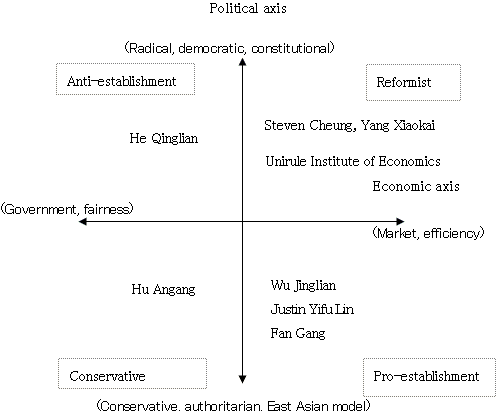In recent years, there have been lively discussions in China among economists about the blueprint for reform and the arguments are so diverse that they can no longer be contained within the simple dichotomy between the reformist and conservative camps. Chinese economists may be classified into four types, "reformist," "conservative," "pro-establishment" and "anti-establishment," based on two axes - whether they believe radical political reforms are necessary or the present authoritarian system should be maintained and, on the economic front, whether they think efficiency should be pursued purely through market principles or whether the government should be allowed to intervene in the market to maintain equality ( diagram ).
Both "pro-establishment" and "reformist" economists maintain that the introduction of market mechanisms is indispensable for China's economic development, but while the former take a cautious stance regarding political reforms, the latter seek more radical changes.
"Pro-establishment" economists, just like the leaders of the Communist Party of China, take a positive attitude toward economic reform but are cautious when it comes to political reform. Support for their argument comes from the success of the East Asian model, which is based on authoritarianism, and the impressive record of China's gradual reform so far. In contrast, collapse of the economies of the former Soviet Union and Eastern Europe and falling standards of living in those countries that accompanied the rapid implementation of political reform have served as prime examples of what not to do. Obviously, most of the 12 economists such as Wu Jinglian, Justin Lin Yifu and Fan Gang who were invited to take part in the economic conference held by Premier Zhu Rongji in June 2002 belong to the "pro-establishment" group. Indeed, they serve as advisors to the party leadership, and have great influence over China's economic policy.
Meanwhile, the reformists, who profess to support liberalism, warn that so long as single party rule by the Communist Party continues and private ownership not fully guaranteed, market mechanisms will not fully function and economic development will sooner or later hit an impasse. Based on this argument, they conclude that political reforms are also necessary conditions for China's economic reforms. This group of economists is represented by such scholars as Steven Cheung of the University of Hong Kong and Yang Xiaokai of Monash University in Australia, and on the domestic front, the researchers at the Unirule Institute of Economics, China's leading research body on new institutional economics, are also considered as belonging to this group.
In contrast to the "reformist" and "pro-establishment" economists, who stress the need to pursue efficiency through market mechanisms, the "conservative" and "anti-establishment" economists place more emphasis on fairness. These economists are more sympathetic toward those who belong to the socially weak groups, and they pay close attention to such problems as the widening gap between the rich and the poor. They maintain that many people have become rich in present-day China simply because they are members of the privileged classes or because they have made money through illegal means. Furthermore, these economists have continued to raise concerns regarding the problems hidden behind China's economic development, such as population issues, the destruction of the environment, and the unraveling of moral fiber.
Although the economists in these two groups share their emphasis on social fairness, they are divided when it comes to the issue of political reform. "Anti-establishment" economists, as represented by journalist He Qinglian, expose the illegal activities of senior officials in government and state-owned enterprises and see the root of corruption as being within the political system. In the end, her works were banned and she had to seek exile in the United States. In contrast, "conservative" economists such as Hu Angang of Tsinghua University do not take a confrontational stance against the government, which in turn seeks their support instead of suppressing them. The "conservative" economists are also called the new left, but unlike traditional leftists, their views are closer to the social democracy in Europe, or "the Third Way," than to Marxism-Leninism.
Thus there are many conflicting views among China's economists, and there seems to be a world of difference between the fates of those who have had great impact on government policies and those who were forced to defect overseas. However, behind the varied paths they have trodden lies the courage of the many Chinese economists who are making all-out efforts in search of the nation's path to modernization, which decides the fate of 1.3 billion people.
Diagram : Four types of Chinese economists



